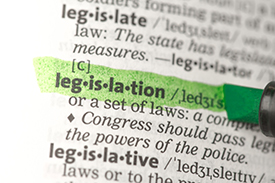March Legislative Roundup: Judicial Selection and Tenure
March 31, 2014
 With state legislatures in session around the country and considering bills that would impact the selection and tenure of state judges, IAALS Online provides this summary of where things stand at the end of March.
With state legislatures in session around the country and considering bills that would impact the selection and tenure of state judges, IAALS Online provides this summary of where things stand at the end of March.
- The Alaska legislature continues to consider a proposed constitutional amendment that would increase the size of the Alaska Judicial Council, which acts as both the judicial nominating commission and judicial performance evaluation commission, and allow the governor to appoint a majority of its members. Hearings are scheduled in both houses this week. SJR 21/HJR 33
- A proposed constitutional amendment would empower outgoing Florida governors to make prospective judicial appointments. That is, it would authorize a governor whose term is ending to replace judges whose terms are ending at the same time. (The terms of three supreme court justices are set to expire in conjunction with the expiration of the next governor's term, and state law is unclear as to who may appoint their replacements.) SJR 1188
- The Hawaii legislature approved a proposed constitutional amendment for the November ballot that would require the nominating commission to make public the names of all nominees submitted to the governor for judicial appointments. (It would also apply to the chief justice, who makes district court appointments.) HB 420
- Minnesota's Impartial Justice Act, which would establish commission-based gubernatorial appointment with retention elections and performance evaluation for state judges, is progressing in the state legislature. HF 1083/SF 1082
- Following former speaker T.W. Shannon's resignation from Oklahoma's house of representatives to run for the U.S. Senate, the judicial reform package he had proposed expired with the first deadline of the legislative session. Shannon had sponsored at least eight bills that would have altered the selection and tenure of the state's appellate judges. A remaining bill would remove members of the judicial nominating commission appointed by the state bar and allow legislative leaders to name their replacements. SB 1988
- A proposed statute in Tennessee would require the Judicial Performance Evaluation Commission to take its votes in public. HB 1559/SB 1730 A second measure would reestablish a judicial nominating commission, with 11 members appointed by legislative leaders. HB 2358/SB 2075
- In Utah, the governor signed a bill requiring that Justice Court judges be included in the state's judicial performance evaluation program. HB 325
- The senate rules committee officially “killed” a measure that would have reduced the size of the Washington Supreme Court from nine to seven members. SB 6088


